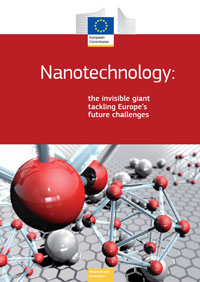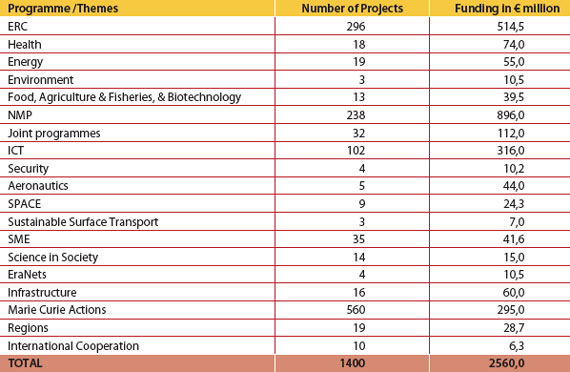| Posted: Jul 01, 2013 | |
An overview of the European Union's nanotechnology projects |
|
| (Nanowerk Spotlight) A new publication by the European Commission outlines nanoscience and nanotechnology dedicated research expenditure in Europe over recent years, in particular via the 7th research framework programme (FP7). An overview is given of the main sectors where nanotechnology is enabling significant progress. It highlights a selection of exemplary projects financed through FP7 that are representative of major research themes, such as nanoelectronics, nanophotonics, nanobiotechnology, nanomedicine, self-assembly, catalysts, industrial applications, energy and environment, tools for investing the nanoscale, health/safety/environment and communication/societal impact. The final chapter focuses on future economic benefits for Europe, such as improving health care, rejuvenating traditional industries and bringing solutions to the most major challenges facing Europe, a secure affordable energy supply and reduced greenhouse gas emissions. | |
 The document, with the slightly weird title of "Nanotechnology – The invisible giant tackling Europe's future challenges" is available as a free pdf download. The European Commission (EC) has explicitly included nanotechnology as a theme in its research funding programmes over the past decade and supported nanoscientists through the European Research Council (ERC). But the current funding regime, the Seventh Framework Programme (FP7), will draw to a close at the end of 2013 to be superseded by a new funding initiative, Horizon 2020, which will run over the next seven-year period. Horizon 2020 promises to capitalise on the research foundations laid by FP6/7 and move into a new phase, where Europe’s intellectual capital is turned into commercial technologies. The new regime promises to address a widely perceived shortfall in technology transfer and put Europe in a strong position to grasp new opportunities in the commercialisation of emerging nanotechnologies across a vast array of different sectors. This transition marks an appropriate moment to take stock of the achievements of the EU’s nanotechnology-related research effort and look ahead to the coming years when the most promising technologies will start to emerge and consolidate. |
|
| The document includes an estimate THAT governments around the world have invested over USD 67 billion in nanotechnology research since 2000 and it points out that Europe’s funding levels are largely comparable to its major competitors, the US and Japan, standing at EUR 6-7 billion in 2007/8. The EC is currently nearing the end of its largest ever research funding initiative, FP7, with a total of EUR 50.5 billion available during 2007-2013 to support projects boosting the region’s competitiveness and tackling the grand challenges facing society in human health, climate change, energy and the environment. | |
| Under FP7, the largest single share of funding for nanotechnology, some EUR 896 million for the period 2007-2011, comes through the dedicated Nanosciences, Nanotechnologies, Materials and new Production Technologies (NMP) stream, but significant support also comes through the Information and Communication Technology (ICT) stream (EUR 316 million), as well as the Health (EUR 74 million), Energy (EUR 55 million) and biotechnology (KBBE) streams (EUR 39.5 million). Meanwhile, the funding mechanisms that support individual researchers also serve as a conduit for nanotechnology related funds, with the European Research Council (ERC) accounting for an estimated EUR 514.5 million and Marie Curie fellowships a further EUR 295 million. | |
 |
|
| FP7 Funding of Nanoscience-Nanotechnologies between 2007 and 2011. (Source EC: Common Research Data Warehouse (CORDA)) | |
| A major new financial instrument, Horizon 2020, will supersede the successful FP research funding initiatives when they come to a close at the end of the year. Running from 2014 to 2020, the proposed EUR 80 billion initiative aims to harness research and innovation to drive new growth and jobs in the region. | |
| For the first time, Horizon 2020 will bring together all research and innovation funding under one umbrella, including a EUR 24.6 billion dedicated science budget, EUR 17.9 billion for industrial innovation including a EUR 1.2 billion package specifically for small- and medium-sized enterprises (SMEs), and EUR 31.75 billion targeted at the most pressing issues facing Europe such as climate change, sustainable transport, renewable energy and the medical care requirements of an ageing population. | |
| One of the already identified cornerstones of the Horizon 2020 programme, under the Future and Emerging Technologies (FET) competition, will be a EUR 1 billion, ten-year sustained initiative dedicated to the investigation and exploitation of the unique properties of graphene. This exceptional nanomaterial possesses such remarkable physical and chemical properties that it has been dubbed the wonder material of the 21st century with far-reaching potential in electronics, transport, energy and medicine. The ‘Flagship’ effort on graphene, which will involve over 100 research groups and 136 principle investigators including four Nobel Laureates, indicates just how important nanotechnology is and will be over the coming decades. | |
| But while the clear priority of the new funding programme is to bridge the gap between research and the market, the central tenant of the European research effort remains excellent science, without which there can be no progress. As Commissioner Geoghegan-Quinn, says: “Knowledge is the currency of the global economy. If Europe wants to continue to compete in the 21st century, we must support the research and innovation that will generate growth and jobs, now and in the future.” | |
 By
Michael
Berger
– Michael is author of three books by the Royal Society of Chemistry:
Nano-Society: Pushing the Boundaries of Technology,
Nanotechnology: The Future is Tiny, and
Nanoengineering: The Skills and Tools Making Technology Invisible
Copyright ©
Nanowerk LLC
By
Michael
Berger
– Michael is author of three books by the Royal Society of Chemistry:
Nano-Society: Pushing the Boundaries of Technology,
Nanotechnology: The Future is Tiny, and
Nanoengineering: The Skills and Tools Making Technology Invisible
Copyright ©
Nanowerk LLC
|
|
|
Become a Spotlight guest author! Join our large and growing group of guest contributors. Have you just published a scientific paper or have other exciting developments to share with the nanotechnology community? Here is how to publish on nanowerk.com. |
|
